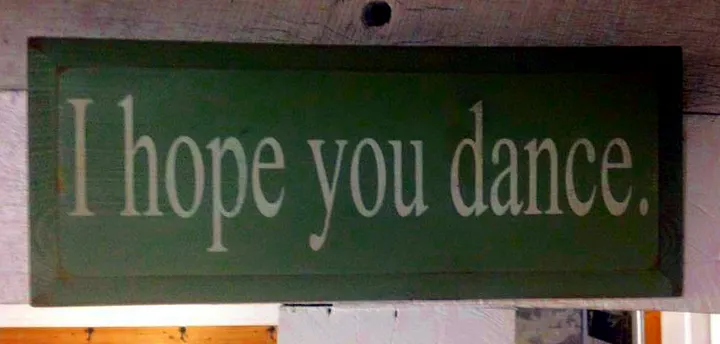The Wooden Mirror
At this beautiful little farm-house resort, where a wedding reception was being held, there was a sign.
It read:
I hope you dance.
Full stop.
This sign was prominently displayed in the common room, near the kitchen, so I passed by it many times; every time I saw it, the voice in my head read it differently.
“I hope you dance.”
“I hope you ‘dance’.” (scare-quotes implied)
Sometimes it was read like Aubrey Plaza as April on Parks & Recreation, other times like Patrick from Spongebob Squarepants. The version I would hear most often, internally, was kind of snarky, like Wayne Campbell from Wayne’s World.
I had some of my peers notice the sign and asked them to read it aloud. Everyone had a slightly different way of reading it. Some were hopeful, others sarcastic. Each person interpreted such a simple phrase in so many different ways.
What would other people think?
Asking on Facebook, eighteen people responded. The most common response (4 people) was that they read it in the voice of LeeAnn Womack, referencing the eponymous country song. The second highest (2 people) was Clint Eastwood, though it was unclear whether this was Dirty Harry or The Good, the Bad, and the Ugly.
Other responses were:
- Bored, matter-of-factly
- Sarcastic
- Hopeful
- (as) Barack Obama
- With a country twang
- Bossy / Passive-aggressive
- Kindly
- Benevolently
- Encouragingly
- Creepy (“in a low gravelly voice”)
- Cranky / Disappointed (as in: “Well you’re a lousy conversationality, I sure hope you dance”)
- Serious / Sternly (“[Because of] the period at the end”) The period at the end was something I had been contemplating. Would it read differently without that?
One commenter said:
There’s a post way back in my feed about the period and how it’s picked up this somewhat negative meaning instead of just ending a sentence. I think it had to do with texting/chatting culture. Basically since we usually don’t bother using it normally, when we do it has added meaning.
This is perhaps similar to how contractions (“I’m here”, “You’re welcome”) are so common, conversationally, that expanding them (“I am here”, “You are welcome”) skews the idiomatic meaning.
While we accept punctuation as given in modern language, when human communication was transitioning from purely verbal to being written down (or perhaps carved, as it were), it was done in a fashion called scriptio continua. Joshua Foer, in Moonwalking With Einstein1, writes:
… words ran together in an unending stream of capital letters known as scriptio continua, broken up by neither spaces nor punctuation. Words that started on one line would spill over to the next without even a hyphen.
When that form of writing was contemporary, the purpose of writing was little more than crib notes to jog the orator’s memory while they recited something, much in the same way you might use Powerpoint notes or cue cards when giving a presentation today.
Modern textual exchanges via texting, instant-messaging, etc. are simultaneously transactional and non-transactional; there is a clear back-and-forth exchange of thoughts happening, but the flow of words and ideas is often incomplete with each message. The period, as it were, cannot easily find a place to rest, or might appear out of place. Texting and messaging, somewhat ironically, mirrors the idiomatic patterns of our spoken communication more closely than those of our written communication.
I hope you dance.
It is a complete thought, a resolved and closed transaction. There is no expectation nor invitation for response. This is written like one would communicate through writing, perhaps in a posted letter, but its brevity is lacking in contextual background like one might expect from a message in a series of messages. The reader is left wondering, like one might be piqued by a vaguebook / subtweet.
In a 2011 article on Wired2, about punctuation in text messages, the period is declared to “[give] a certain air of finality to a statement”, and that they “end things. Leaving [a period] out keeps things open.”
I hope you dance.
In the context vacuum, we are forced to answer the questions of its circumstance from our own experience. Why do you hope I dance? You hope I dance how? WHO ARE YOU? This, then, may explain some of the variety of tones, attitudes, and voices that the commenters associated with the phrase.
Our expectation of tone may very well influence the perceived tone of how we read it — the sentence then becomes a mirror that we project our own reflection of how we would be addressed.
I hope you dance.
Footnotes
- Moonwalking with Einstein: The Art and Science of Remembering Everything. Foer, Joshua.
- 11 Secret Meanings Behind Punctuation in Text Messages. Greenspan, Sam. Wired.com
